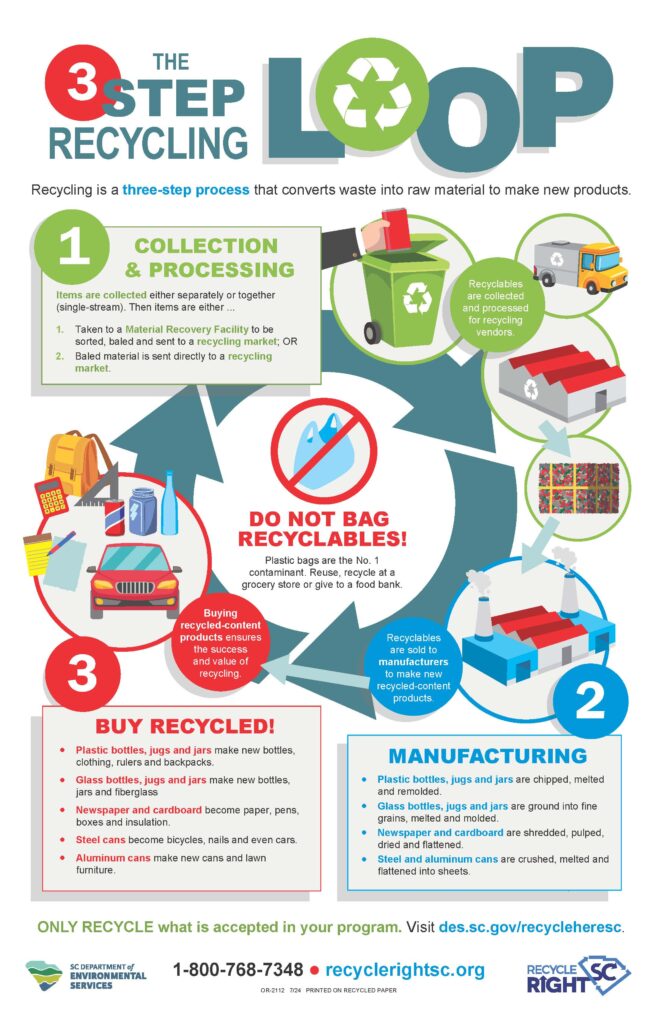Recycle Right
 Understanding what can be recycled, where, and how can get confusing. This confusion often leads to placing recyclables in the trash or throwing trash into the recycling bin. To help, here are answers to the most frequently asked questions about household waste management.
Understanding what can be recycled, where, and how can get confusing. This confusion often leads to placing recyclables in the trash or throwing trash into the recycling bin. To help, here are answers to the most frequently asked questions about household waste management.
(1) What is recycling?
Recycling is collecting items that otherwise would be thrown away and turning them into new products.
(2) Why recycle?
Recycling conserves natural resources, saves energy, provides raw material to manufacturers to make new products, creates jobs, and much more. Learn more about why to do it here.
(3) Where can I recycle?
Hilton Head 26 Summit Drive, Hilton Head Island 29926 Phone: (843) 681-3731
Hours of Operation: Sunday – Tuesday, Thursday – Saturday, 7:3AM – 6PM
CLOSED Wednesdays & Holidays
(4) What can I recycle?
- Aluminum cans
- Appliances, large (refrigerators, washers, dryers)
- Antifreeze
- Batteries, lead-acid (car, truck, boat)
- Batteries, rechargeable
- Bulbs, fluorescent
- Cardboard
- Cooking oil
- Furniture (sofas, tables, dressers)
- Glass (clear, brown, green)
- Herbicides and pesticides
- Mattresses
- Mixed paper (office paper, magazines, newspaper, inserts)
- Paint, stains and varnishes
- Plastic bottles and jugs with plastic caps removed (the caps may be recycled separately)
- Plastic film (air pillows, bubble wrap, dry-cleaning bags, food storage bags, napkins/paper towel packaging, newspaper bags, plastic shopping bags, produce bags). It’s ok to use trash bags to collect recycled materials, but please open the bags and dump the recyclables into the bins and dispose of the bags separately.
- Scrap metal
- Steel and tin cans
- Telephone books
- Tires (limit four per day; car, motorcycle, truck)
- Used motor oil, filters, and bottles
(5) What does “Recycle Right” mean?
“Recycle Right” means only placing items in the bin or cart that are accepted by Hilton Head Island
Incorrect or improperly prepared items – called contamination – can harm your recycling program. Contamination can result in:
- a decrease in the value of the material to be recycled;
- disposal of material that could be recycled;
- an increase in local government recycling program costs to remove the contamination;
- a reduction of services or material accepted in your recycling program; and
- elimination of your recycling program.
Be smart: Don’t trash recycling
It is essential to follow is what is accepted as noted above and to properly prepare these items. Remember, when in doubt, leave it out.
Properly prepared means recyclables must be:
- Dry– No liquids remaining. Liquids can ruin paper, cardboard, and other material in the recycle bin, making them contamination;
- Empty– No or little food residue remaining; and
- Loose– Do NOT bag your recyclables.
Items that should never be recycled:
(1) PLASTIC BAGS
Reuse, donate to food banks, or recycle at your local grocery store. It’s ok to use trash bags to collect recycled materials, but please open the bags and dump the recyclables into the bins and dispose of the bags separately.
(2) BAGGED RECYCLABLES
Place items loose in your recycling cart or bin.
(3) LIQUIDS
Empty liquids from all recyclable containers.
(4) FOOD
No food or recyclable containers with food residue. This includes greasy pizza boxes.
(5) STYROFOAM CLAMSHELLS & PLASTIC CONTAINERS
No styrofoam clamshells or other plastic containers used to hold takeout food, berries, or lettuce.
(6) ROPE-LIKE ITEMS
No string lights, water hoses, wire, or similar items.
(7) SCRAP METAL
No pots and pans, silverware, bicycles, car parts, or plumbing leftovers. Donate these or take them to a convenience center or scrap yard.
(8) BATTERIES
Batteries can cause fires or explode if not properly managed. Recycle rechargeable batteries at Best Buy, Lowe’s, Target, The Home Depot, and other retail outlets. Learn more at Be Battery Smart.
(9) HOUSEHOLD CHEMICALS
Give products to someone who will use them. Check local program options (i.e., household hazardous waste events or programs) at RecycleHereSC or dispose of these items according to label instructions.
(10) PLASTIC PACKAGING
No block foam, bubble wrap, peanuts, or shrink wrap.
(11) PROPANE AND BUTANE CYLINDERS
Do not place these in household trash or recycling bins. Both pose dangers (e.g., fire, explosion) to workers and machinery in recycling facilities. Check RecycleHereSC to see if your program has a household hazardous waste program or an upcoming single-day event. Many retailers also accept these containers.
(12) DIRTY DOZEN PLUS
No clothing, hangers, frozen food boxes, ice cream containers, toys, VHS tapes, CDs, ceramics, glassware, CFLs and other light bulbs, paint, motor oil, shoes, syringes, sharps and needles, or textiles.
| Items that never go in your recycling bin: | |
| Batteries (household | Pizza boxes (greasy) |
| Batteries (lead-acid) | Plastic bags |
| Bubble wrap | Polystyrene |
| Christmas lights | Rubber balls |
| Coat hangers | Scrap metal |
| Chains | Sharps (e.g., needles, syringes) |
| Clothes | Shredded paper |
| Diapers | Sports equipment |
| Electronics | Razor blades |
| Electrical cords | Take-out containers |
| Food waste | Tires |
| Food wrap | Toys |
| Garden hoses | Tubes (e.g., toothpaste) |
| Household cleaners | Stuffed animals |
| Household glass (e.g., ceramics, mirrors) | Waxed cartons |
| Light bulbs | Wood |
| Paint | Yard trimmings |
(6) Beach Toy Recycling
Beach toys may be recycled on the beach by the Dunes House and at the beach entrance off of Port Tack.